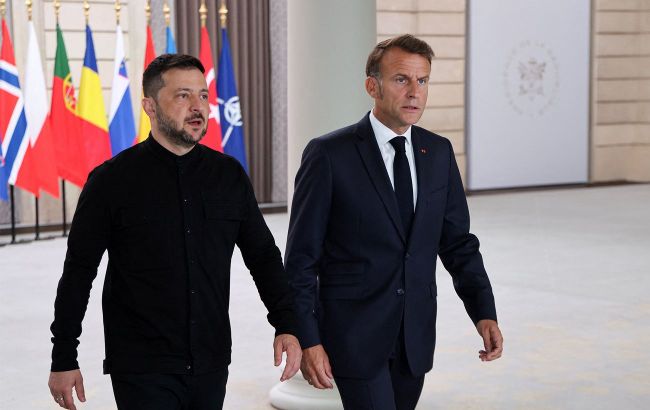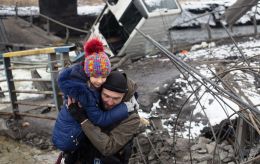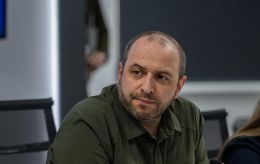Zelenskyy in Paris, Putin in China – Highlights of week’s negotiations
 Volodymyr Zelenskyy and Emmanuel Macron (Photo: Office of the President of Ukraine)
Volodymyr Zelenskyy and Emmanuel Macron (Photo: Office of the President of Ukraine)
As expected, there was no real progress in the negotiation process this week. However, there was plenty of diplomatic activity.
RBC-Ukraine reports on the main meetings of the Ukrainian leadership with its allies, as well as on the statements of the aggressors.
Key questions
-
What did Zelenskyy, Trump, and European leaders discuss in Paris?
-
What progress has been made on security guarantees for Ukraine?
-
What did Putin’s visit to China reveal?
From Copenhagen to Paris
Before his trip to Paris on September 4, Ukrainian President Volodymyr Zelenskyy visited Copenhagen and took part in the Ukraine–Nordic and Baltic States summit.
The summit focused on coordinating positions regarding security guarantees for Ukraine and other forms of support. Following the meeting, Zelenskyy stated that there are currently no signs that Russia is ready to end the war. He emphasized that Russia carries out massive attacks on Ukraine several times a week.
"This is a clear signal that Russia rejects any attempts to end the war and wants to continue hostilities. We must proceed from the fact that, for now, this is Russia’s main scenario," Zelenskyy said.
During the Paris meeting on September 4, Volodymyr Zelenskyy and other European leaders held their now-traditional online conversation with US President Donald Trump.
"We discussed various options, and the most important thing is pressure, to force an end to the war with strong measures, including economic ones. The key to peace is depriving Russia’s war machine of money, depriving it of resources," Zelenskyy later reported.
According to The Guardian, during the call, Trump urged Europe to take two steps against Russia. First, to give up Russian oil (although this has largely already happened, with only Slovakia and Hungary as exceptions). Second, to step up economic pressure on China to punish it for financing Russia.
Clarifying security guarantees
Following the meeting in Paris, French President Emmanuel Macron stated that there is currently a political and military proposal on the table from 35 leaders of the Coalition of the Willing to provide Ukraine with security guarantees. Of these, 26 countries have committed to helping guarantee Ukraine’s security.
"These 26 countries agreed to deploy troops to Ukraine as a guarantee force, or to be present on land, sea, or in the air to support Ukraine and its territory the day after a ceasefire or peace agreement is reached," Macron noted.
However, according to the Financial Times, the member states of the Coalition of the Willing are divided on providing security guarantees that involve deploying troops on Ukrainian territory. Sources told the outlet that one group of countries, including the United Kingdom, is ready to deploy troops in Ukraine. Others, such as Italy, are opposed. And the majority, including Germany, have not yet made a decision.
According to Macron, the deployment of the contingent would take place under ceasefire conditions, not along the front line, but in geographic zones that are now being determined. The goal is to prevent any new large-scale aggression.
"We agreed that there will be a presence (of foreign troops in Ukraine - ed.). I am not ready to say the number yet, although, to be honest, we are already sharing among ourselves, we understand the approximate number of those who have already agreed," Zelenskyy added.
In addition, Ukraine has begun discussing with its partners a new format for protecting its skies from Russian attacks. But this requires the participation of the US. As Zelenskyy noted, if there is a positive signal from the US, the details of the format can be disclosed.
Statements from Trump and Putin
The events in Paris, however, did not affect Trump’s position on Russia. He continues to refuse to impose sanctions on the aggressor.
At the beginning of the week, on September 2, Trump said he was “very disappointed” with Putin, who still had not agreed to meet with Zelenskyy. The deadline he had set for Putin to arrange a meeting with Zelenskyy expired on September 1. But when the US president was asked about possible consequences if no meeting between Putin and Zelenskyy is announced soon, he gave his usual answer.
"We're going to see what they do and what happens. I'm watching it very closely," Trump said.
Just two days later, the US president noted that he remains committed to seeking a peace agreement between Russia and Ukraine, despite the growing uncertainty around the issue. Still, the leaders of Ukraine and Russia are "not ready yet" for a summit.
In an interview with CBS News, he described his stance on the talks as "realistic and optimistic," and added that he is closely monitoring how Zelenskyy and Putin are navigating the challenges on the road to negotiations.
Meanwhile, Russia continues to drag out the process. Putin made two notable statements. At the beginning of the week, he said he "does not rule out" a meeting with Zelenskyy. But, according to him, the Ukrainian president would have to come to Moscow. Kyiv dismissed such a proposal for obvious reasons.
On September 5, Putin stated that he saw little point in such a meeting. The Russian leader also claimed he might raise the level of the Russian delegation for political negotiations.
"If there is a need to take steps toward raising the level (of negotiations - ed.), bringing it to the political level, we are ready for that," Putin said.
He clarified, however, that he is not yet ready to provide details or name the individuals who could join the Russian delegation.
Putin’s trip to China
Putin likely gained additional confidence from his visit to China. While attending the Shanghai Cooperation Organization (SCO) summit, the Russian President was warmly received by Chinese leader Xi Jinping and held meetings with Indian Prime Minister Narendra Modi. During the summit, Putin once again declared that he seeks to achieve his goals in the war.
"For a settlement in Ukraine to be sustainable and long-term, the root causes of the crisis must be eliminated." He once again repeated the usual propaganda narratives, claiming that the crisis was not caused by Russia’s invasion but by a "coup in Ukraine, supported and provoked by the West." According to him, another reason for the crisis lies in the "constant attempts by the West to draw Ukraine into NATO."
However, the SCO summit’s final statement did not contain a single mention of Russia’s war against Ukraine. As Ukraine’s Ministry of Foreign Affairs later stated, the Kremlin failed to impose its narrative about the war on the SCO member states.
In addition, Putin attended a military parade in Beijing marking the 80th anniversary of victory over Japan in World War II. Joint photos of Xi Jinping, Putin, and North Korean leader Kim Jong Un appeared intended to showcase the strength of the China–Russia–North Korea alliance. Against this backdrop, China’s stance on the Russia-Ukraine war remains unchanged.
North Korean leader Kim Jong Un also confirmed his willingness to provide military assistance to Russia. He remarked that if Pyongyang can help Russia in any way, it will certainly do so, describing it as a "brotherly duty."
Commenting on the meetings in China, President Zelenskyy noted that Putin would use his meeting with Xi Jinping as a kind of "permission" to continue the war in Ukraine.
Overall, this week saw continued shaping of the negotiating positions with which Ukraine and Russia might eventually approach final talks. However, this process is not yet complete. Clearly, the Kremlin is in no hurry.
Moreover, Trump is de facto not pressing for an acceleration of negotiations. Contacts will continue next week, with another phone call between Trump and Putin already announced. However, the chances of a breakthrough during that conversation remain slim.

